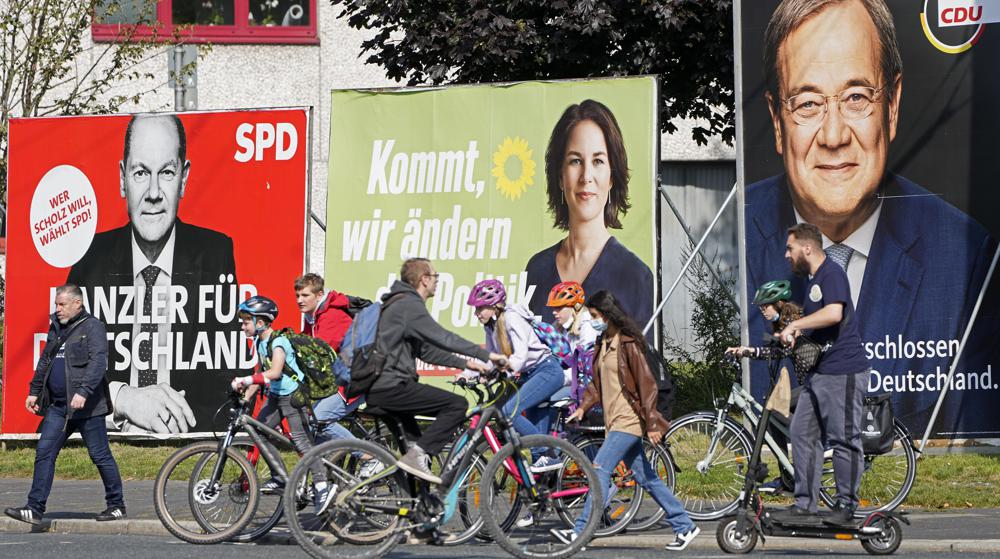Closely fought German election ushers in post-Merkel era

By GEIR MOULSON, BERLIN, Sept. 26 (AP) — German voters are choosing a new parliament in an election that will determine who succeeds Chancellor Angela Merkel after her 16 years at the helm of Europe’s biggest economy.
Polls point to a very close race Sunday between Merkel’s centre-right Union bloc, with state governor Armin Laschet running for chancellor, and the centre-left Social Democrats, for whom outgoing finance minister and Vice-Chancellor Olaf Scholz is seeking the top job.
Recent surveys show the Social Democrats marginally ahead. The environmentalist Greens, with candidate Annalena Baerbock, are making their first run for the chancellery, and polls say they are several points behind in third place. The Social Democrats have been boosted by Scholz’s relative popularity after a long poll slump. Baerbock suffered from early gaffes and Laschet, the governor of North Rhine-Westphalia state, has struggled to motivate his party’s traditional base.
About 60.4 million people in the nation of 83 million are eligible to elect the new Bundestag, or lower house of parliament, which will elect the next head of government.
No party is expected to come anywhere, near an outright majority. Polls show support for all of them below 30 per cent.
Such a result could mean that many governing coalitions are mathematically possible, and trigger weeks or months of haggling to form a new government. Until it is in place, Merkel will remain in office on a caretaker basis.
Merkel has won plaudits for steering Germany through several major crises. The new chancellor will have to tend the recovery from the coronavirus pandemic, which Germany so far has weathered relatively well thanks to large rescue programs that have incurred new debt.
Laschet insists there should be no tax increases as Germany pulls out of the pandemic. Scholz and Baerbock favour tax hikes for the richest Germans, and also back an increase in the minimum wage.
Scholz on Friday touted the outgoing government’s success in preserving jobs during the pandemic, declaring that “we are succeeding in avoiding the major economic and social crisis that otherwise would have hit us.”
“We will achieve new growth if we do the right thing now in economic policy,” Laschet said at a rally Saturday in his home city of Aachen. “If we do it wrong now, with ideological experiments, everything that we have built up in 16 years will be squandered.”
Merkel, making the last of only a handful of appearances in this campaign, praised Laschet as someone who “builds bridges, takes people along with him.”
Germany’s leading parties have significant differences in their proposals for tackling climate change. Laschet’s Union bloc is pinning its hopes on technological solutions and a market-driven approach, while the Greens want to ramp up carbon prices and end the use of coal earlier than planned. Scholz has emphasized the need to protect jobs as Germany transitions to greener energy.
Foreign policy hasn’t featured much in the campaign, though the Greens favour a tougher stance toward China and Russia.
As they have struggled in polls, Laschet and other Union leaders have warned that Scholz and the Greens would form a coalition with the opposition Left Party, which opposes NATO and German military deployments abroad. Whether such a partnership is realistic is questionable, given foreign policy and other differences between the parties, but that line of attack may help turn out the conservative base.
Scholz has said he’d like a two-party coalition with the Greens, but that looks very optimistic. Absent a majority for that, his first choice would likely be an alliance with the Greens and the pro-business Free Democrats.
A coalition with those two parties is also Laschet’s likeliest route to power. The Greens favour an alliance with the Social Democrats, while the Free Democrats prefer one with the Union.
The result may also allow a repeat of the outgoing “grand coalition” of the traditional big parties, the Union and Social Democrats, under either Scholz or Laschet.
The far-right Alternative for Germany party is polling a little below the 12.6 per cent it won to enter parliament in 2017, but won’t feature in any new government this time either. All other parties say they won’t work with it.
The Bundestag has at least 598 seats, but Germany’s complex voting system means that it can be considerably larger. The outgoing parliament had a record 709 seats and the new one is widely expected to be even bigger.
The number of people voting by postal ballot is expected to be higher than the 28.6 per cent who did so four years ago. Also Sunday, voters in Berlin and in Mecklenburg-Western Pomerania in northeastern Germany — both states currently led by the Social Democrats — are electing new state legislatures.
Recent News

Do not make expressions casting dout on election: EC
14 Apr, 2022
CM Bhatta says may New Year 2079 BS inspire positive thinking
14 Apr, 2022
Three new cases, 44 recoveries in 24 hours
14 Apr, 2022
689 climbers of 84 teams so far acquire permits for climbing various peaks this spring season
14 Apr, 2022
How the rising cost of living crisis is impacting Nepal
14 Apr, 2022
US military confirms an interstellar meteor collided with Earth
14 Apr, 2022
Valneva Covid vaccine approved for use in UK
14 Apr, 2022
Chair Prachanda highlights need of unity among Maoist, Communist forces
14 Apr, 2022
Ranbir Kapoor and Alia Bhatt: Bollywood toasts star couple on wedding
14 Apr, 2022
President Bhandari confers decorations (Photo Feature)
14 Apr, 2022










